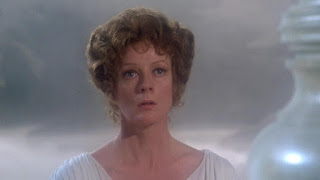Most people familiar with Greek mythology know that the Greek gods were said to be easily offended. No woman in Ancient Greek would dare compare her beauty to a Goddess, for fear of major punishment. Right now we're going to look at one of the most popular Greek Myths, the story of Perseus, as portrayed by the film entitled, Clash of the Titans.

 Once upon a time, King Acrisius of Argos has locked his daughter Danae and her infant son Perseus inside a chest and has thrown it into the sea. Why? Acrisius locked Danae away in a tower to prevent the prophecy which says that if Danae were to have a son, he would be the cause of Acrisius's death. Hidden only from the eyes of mortal men, the King of the Greek Gods, Zeus, visits Danae. Soon after, Danae bears the son of Zeus, Perseus. Now a furious Acrisius has thrown Danae and Perseus into the sea. But with Poseidon's help, they survive. Now Zeus' anger has risen against Acrisius, thus a horrible monster known as the Krakken is released and destroys Argos.
Once upon a time, King Acrisius of Argos has locked his daughter Danae and her infant son Perseus inside a chest and has thrown it into the sea. Why? Acrisius locked Danae away in a tower to prevent the prophecy which says that if Danae were to have a son, he would be the cause of Acrisius's death. Hidden only from the eyes of mortal men, the King of the Greek Gods, Zeus, visits Danae. Soon after, Danae bears the son of Zeus, Perseus. Now a furious Acrisius has thrown Danae and Perseus into the sea. But with Poseidon's help, they survive. Now Zeus' anger has risen against Acrisius, thus a horrible monster known as the Krakken is released and destroys Argos. Perseus has grown into a young man. Zeus is proud and brags about him. But Zeus frowns upon the son of Thetis, goddess of the sea. Thetis's son, Calibos, is a handsome but ignorant man spoiled by his mother. He has hunted countless creatures for sport, even Zeus's herd of flying horses, leaving only the winged horse, Pegasus. As punishment, Zeus curses him with deformity, changing him into what looks like a monster. Now Thetis is angry, for Calibos was engaged to the Princess Andromeda of Joppa. If Calibos can't marry Andromeda, says Thetis, then no one will. Being jealous of Perseus, Thetis uses her powers to transport him to the city of Joppa, saying it's time for him to experience the real world. With the help of some new friends, Perseus is able to win the hand of Andromeda. Of course, Thetis is not at all happy about this. In the middle of their wedding ceremony, Andromeda's mother compares her to Thetis. Angry, Thetis shows herself, demanding the life of Andromeda. If the people don't obey, the Krakken will be set lose on Joppa. Can Perseus defeat the Krakken and save Andromeda, or will she be lost to sacrifice?
 Rather than the actors and like other Greek myths, Clash of the Titans is known for its monsters. In this film viewers will see a bunch of horrifying creatures brought to life by the one and only Ray Harryhausen. It may not be your typical CGI, but it still works and looks realistic enough when combined on film with the actors such as the fight with the two-headed dog, Cerberus. Without the monsters, Clash of the Titans would significantly have less action scenes.
Rather than the actors and like other Greek myths, Clash of the Titans is known for its monsters. In this film viewers will see a bunch of horrifying creatures brought to life by the one and only Ray Harryhausen. It may not be your typical CGI, but it still works and looks realistic enough when combined on film with the actors such as the fight with the two-headed dog, Cerberus. Without the monsters, Clash of the Titans would significantly have less action scenes. During a particular scene with Andromeda, I noticed something regarding the colors. In the scene she is preparing with her ladies-in-waiting to face the Krakken. While Andromeda is blond-haired, her ladies all have dark hair, which makes her stand out from the people around her. This may be so because the film makers want you to notice her. There are many lovely women in this scene as well as the film, but in that moment Andromeda is the main character to focus on.
There are a bunch of noticeable aspects in Clash of the Titans. If you've seen Clash of the Titans from 2010, you should definitely see the original as well; since the two are similar but quite different at the same time.
Do you agree with this? Feel free to check out my Easter post on Ben-Hur! Also be sure to like, comment, share, and follow to come back for more on ETF!








